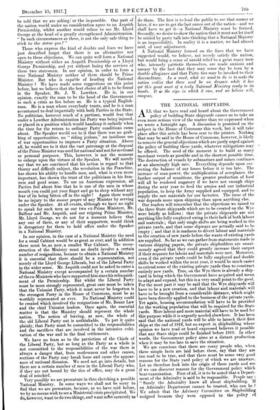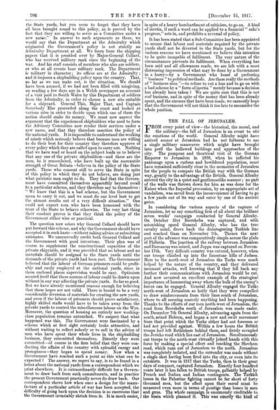THE NATIONAL SHIPYARDS.
A LL that we have read and heard about the Government policy of building State shipyards causes us to take an even more serious view of the matter than we expressed when we wrote a fortnight ago. A discussion is promised on the subject in the House of Commons this week, but it will take place after this article has been sent to the printer. Nothing that may be said in the House of Commons, however, is likely to remove the general objections which are justly urged against the policy of building these yards, whatever mitigations may be offered. The need of the moment is to build as ninny merchant vessels as possible and in the shortest possible time. The destruction of vessels by submarines and mines continues at an alarmingly high rate. Everything depends upon cor- recting the balance of our losses before it is too late. The increase of man-power, the multiplication of aeroplanes. the further output of munitions, the greater production of food will all be rendered nugatory if we have not enough ships during the next year to feed the armies and our industrial population, to keep the Army supplied and equipped, and to supply the raw materials for our factories. The issue of the war depends more upon shipping than upon anything else. Our readers will remember that the objections we raised to the three State shipyards which are to be created on the Wye were briefly as follows : that the private shipyards are not anything like fully employed owing to their lack of both labour and materials ; that only single shifts are being worked in the private yards, and that some slipways are actually said to be empty ; and that it is madness to divert labour and materials to the creation of new yards before the wants of existing yards are supplied. So far as we can gather from statements made in various shipping papers, the private shipbuilders are unani- mously agreed that they could greatly increase their output if their requests for labour and materials were met. Moreover, even if the private yards could be fully employed and double shifts be worked within the next year, it would be much easier to extend aome of the existing private yards than to construct entirely new yards. True, on the Wye there is already a ship- yard in being which the Government have acquired and mean to adapt and expand, but this is a very small point to the good. For the most part it may be said that the Wye shipyards will have to be a new creation, and that labour and materials will have to be brought from a considerable distance, which might have been directly applied to the business of the private yards. Yet again, housing accommodation will have to be provided for the working population that will be required for the State yards. More labour and more material will have to be used for this purpose while it is urgently needed elsewhere. It has been said that the national yards will be able to launch their first ships at the end of 1918, but no expert in shipbuilding whose opinion we have read or heard expressed believes it possible that any State ships could be finished before 1919. In other words, the Government policy aims at a distant production when it may be too late to save the situation.
We are conscious that there are many people who, when these simple facts are laid before them, say that they are too mad to be true, and that there must be some very good reasons for the State yard policy of which we are unaware. Let us therefore look into the origin of these yards and see if we can discover reasons for the Government policy which bear examination. First of all, it is to be noted that a Depart- ment of the Admiralty is said to be responsible. People say : "Surely the Admiralty know all about shipbuilding. If an Admiralty Department cannot be trusted, who can be ? We admit that the Advisory Committee on Shipbuilding resigned because they were opposed to the policy of the State yards, but you seem to forget that they have all been brought round to this policy, as is proved by the fact that they are willing to serve as a Committee under a new name." In answer to such arguments as these, we would say that the Department at the Admiralty which originated the Government's policy is not strictly an Admiralty Department at all. We learn from the shipping papers that it is presided over by Major-General Collard, who has received military rank since the beginning of the war. And his staff consists of members who also are soldiers, or who at all events bear military rank. The Department is military in character; its offices are at the Admiralty ; and it imposes a shipbuilding policy upon the country. That, so far as we can make out, is the situation. We should have been amused, if we had not been filled with misgiving, on reading a few days ago in a Welsh newspaper an account of a visit paid to South Wales by this Department of soldiers from the Admiralty, in order to choose a new site suitable for a shipyard. General This, Major That, and Captain Somebody Else proceeded along the coast and looked at various sites in order to decide upon which one of them the nation should stake its money. We must now answer the argument that the experienced shipbuilders who used to form the Advisory Committee now render their services under a new name, and that they therefore sanction the policy of the national yards. It is impossible to understand the working of minds which seriously believe that because men are willing to do their best for their country they therefore approve of every policy which they are called upon to carry out. Nothing that we have read or heard on the subject leads us to believe that any one of the private shipbuilders—and these are the men, be it remembered, who have built up the mercantile strength of Great Britain—believes in the policy of the State yards. Those who consent still to serve the State in spite of this policy in which they do not believe, are doing just what patriotic men ought to do. They find that the Govern- ment have committed themselves apparealy beyond recall to a particular scheme, and they therefore say to themselves : "We know that this is a bad scheme, but the Government mean to carry it out, and we must do our level beat to get the utmost results out of a very difficult situation." One could not expect men who have been honoured with the trust of the State to behave otherwise. The very last thing their conduct proves is that they think the policy of the Government either wise or practical.
The question now arises why General Collard should have put forward this scheme, and why the Government should have accepted it in each haste—without taking advice or aubraitting eatimates. We unreservedly credit both General Collard and the Government with good intentions. Their plan was of course to supplement the constructional capacities of the private shipyards, and it was provided that no labour and no materials should be assigned to the State yards until the demands of the private yards had been met. The Government believed that the labour of German prisoners could be profit- ably and easily employed at the national yards, since in these enclosed places supervision would be easy. Optimism assured itself that these sources of labour could be drawn upon without in any way affecting the private yards. So far so good. But we have already mentioned reasons enough for believing that these hopes are not valid. There is bound to be a very considerable diversion of materials for creating the new yards, and even if the labour of prisoners should prove satisfactory, highly skilled staffs would have to be taken away from the private yards to control the miscellaneous labour on the Wye. Moreover, the question of housing an entirely new working- class population remains untouched. We suspect that what happened was this. The Government were fascinated by a scheme which at first eight certainly looks attractive, and without waiting to reflect soberly or to call in the advice of men who have spent their whole lives in the shipbuilding business, they committed themselves. Directly they were committed—of course in the firm belief that they were con- ducting the affairs of the country with splendid energy and promptness—they began to spend money. Now when a Government have reached such a point as this what can be expected I The answer, we regret to say, is to be found in a letter about the national yards from a correspondent which we print elsewhere. It is extraordinarily difficult for a Govern- ment to draw back from such commitments, and in practice the present Government practically never do draw back. Our correspondent shows how when once a design for the manu- facture of a particular article of war has been accepted, the difficulty of going back upon the decision is so enormous that the Government invariably shrink from it. It is much easier,
in spite of a heavy bombardment of criticism, to go on. A kind of inertia, if such a word can be applied to a financial" rake's progress," sets in, and prohibits a reversal of policy:.
It bas been stated that a Sub-Committee has been appointed to secure that labour and materials required by the private yards shall not be diverted to the State yards, but for the various reasons we have mentioned we believe this intention to be quite incapable of fulfilment. The very nature of the circumstances prevents its fulfilment. When everything has been said and all allowances made, we are left with a most distressing impression of what may be done by a Government in a hurry—by a Government who boast of preferring "business " toyolitical methods. Are these really the methods of " business men "—to refuse to cut a loss and to go on with a bad scheme by a" force of inertia "merely because a decision has already been taken l We are quite sure that this is not real business, and in spite of the money that has been already spent, and the excuses that have been made, we earnestly hope that the Government will not think it too late to reconsider the whole position.



































 Previous page
Previous page